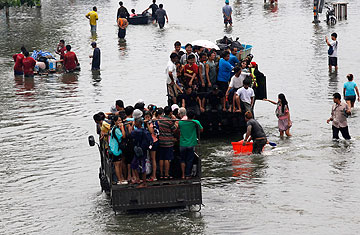
Thais evacuate a flooded area in Bangkok's suburbs on Oct. 20, 2011
One week after Thailand's new Prime Minister declared Bangkok would be safe from record-breaking floods ravaging the country, residents of the Thai capital were bracing Thursday for what appeared to be an inevitable inundation as water from northern and central provinces continued surging down the Chao Phraya river.
Sandbags were piled outside homes, offices and shopping malls in still-dry central Bangkok, as bottled water and other essentials flew off shelves at supermarkets and convenience stores around town. Outlying northern and eastern areas of the city were already under water. Bangkok Governor Sukhumband Paribatr warned that a massive run-off would hit Rangsit, a northern suburb of the city, on Thursday evening, with another surge of flood water to follow on Friday night down the Chao Phraya. Soldiers, city workers and neighborhood volunteers were out in force doing their best to shore up flood walls and dykes, some of which were reportedly near their breaking points or close to overflowing.
Meanwhile, bickering between elected officials marred relief efforts. Opinion polls have panned the national government's efforts at managing the crisis, and Bangkok Governor Sukhumband urged people in the capital to ignore the national government's statements and listen only to him. Prime Minister Yingluck Shinawatra, elected in July, responded today by saying she and her team "are doing all we can to handle the situation. Let's set aside politics. I need cooperation from all sides.''
The worst flooding to hit Thailand in decades has killed 315 people and affected over 2.4 million in at least 26 of the country's 76 provinces, according to the United Nations Office for Coordination of Humanitarian Affairs. Homes, farmland and industrial estates have been washed away or submerged. The Bank of Thailand predicts the damage could drive down gross domestic product by as much as 1.7 percent for the year, leave untold numbers of people homeless, hundreds of thousands of workers temporarily unemployed, and drive up food price inflation as crops, and especially parts of the rice crop, are destroyed.
Neighboring countries have also been suffering during this particularly heavy Southeast Asian monsoon season. With the Mekong and Tonle Sap Rivers also swelling, 247 people have perished in Cambodia and 1.2 million people have been affected, 55 have died in Viet Nam and 330,000 affected, and 30 were killed in Laos and 430,000 affected. The monsoons have also triggered floods as far away as the Philippines, where 98 have died and four million have been affected, and Pakistan where hundreds have died and nearly five million affected.
The image of Thai Prime Minister Yingluck Shinawatra and her government have also suffered during the disaster. In office for just over two months and with no prior political experience, her management skills have come under fire from critics and the media. In an opinion poll conducted by Assumption University, respondents gave the government a score of 3.3 out of 10 as far as managing the crisis and giving clear information to the public. Her ministers have issued at least two false alarms to evacuate that sent thousands of people fleeing unnecessarily, while assuring certain areas they were safe which later flooded. "You can't believe anything they say until you see the flood waters at your own feet,'' said Rin Minckler, a spa owner in Nonthaburi, just north of Bangkok, who was moving furniture and equipment to higher floors.
Although Prime Minister Yingluck has been working around the clock — she appeared on television at 4 a.m. Thursday — she's been lampooned by political cartoonists and others after being photographed wearing expensive Burberry rain boots while touring flooded neighborhoods populated mainly by poor people. Minister of Commerce Kittirat na Ranong, stoic as the farm land and homes of Thais were destroyed, was filmed breaking down in tears in the arms of a Japanese investor whose factory had been damaged. Foreign investors have said the government must come up with a long-term plan to prevent future flooding if Thailand is to remain a hub for manufacturing.
Opposition politicians have urged the Prime Minister to invoke a state of emergency, but the government has resisted, as it would mean sharing emergency powers with military leaders and other security officials. Relations between the government and the military are tense, as ruling politicians have been pushing to amend laws in order to give them greater power over appointments and promotions in the armed forces.
